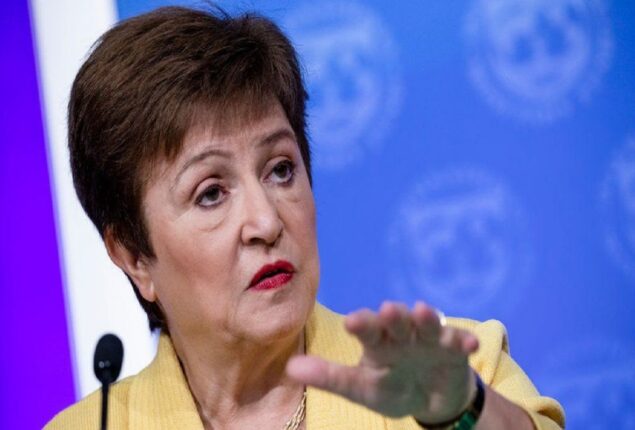Yellen meets Japan’s top investor in the midst of economic challenges
The meetings come as the yen is trading at 24-year lows. Yellen's...

IMF warns of ‘darkening’ global economic outlook. (credits: Google)
The head of the International Monetary Fund has stated that this month, the organisation would revise its projections for global economic growth.
Its most recent prediction, made in April, was for growth of 3.6 percent this year and the following.
The continued Covid epidemic, higher-than-expected inflation, and the conflict in Ukraine, according to Kristalina Georgieva, all to blame.
She claimed that these are aggravating the expense of living situation for millions of people.
She continued, “And the poorest are suffering the most.”
It occurs at a time when inflation in the US, the world’s largest economy, has risen to 9.1%, the highest level in more than 40 years.
The G20 finance ministers and governors of the central banks are getting ready to meet in Bali when she issues her warning that the economic picture “has darkened markedly.”
They have a long list of concerns for the world economy on their agenda, such as rising commodity prices, food security, and the effects of the war in Ukraine because that country was a significant supplier of food.
Perry Warjiyo, governor of Indonesia’s central bank, is sceptical about the possibility of coming to a decision regarding the next course of action, saying: “We hope for the best, but of course prepare for the worse.”
In a blog post, Ms. Georgieva said that the inflation has “broaden beyond food and energy prices” and that as a result, many central banks have raised borrowing costs, a trend that will “need to continue.”
In an effort to combat inflation, which has increased to 7.7 percent, Canada became the most recent major central bank to raise interest rates, lifting its key rate from 1.5 percent to 2.5 percent.
The largest hike in 24 years, larger than projected, according to bank governor Tiff Macklem, “reflects worry that inflation is too high and it’s harming all Canadians.”
More and more experts believe that the US Federal Reserve will boost interest rates significantly when it meets later this month. This year, it has already experienced three hikes.
Since higher interest rates force businesses and consumers to use more money to repay loans rather than spending it on goods and services, they are often employed to lower inflation.
According to the IMF, 75 central banks increased interest rates by an average of 3.8 times in the previous year.
However, Ms. Georgieva warns that if this trend changes, “far more harm to GDP and employment” will result, and that “acting now will hurt less than acting later.”
There is also a warning that nations that have injected billions of dollars into their economies to sustain them during the pandemic need to limit that in order to diminish the demand for products and services that is being fueled by that money.
She added that cash handouts “to support disadvantaged households” are still required, particularly for those who are most negatively impacted by increased energy or food prices.
This spending, according to Ms. Georgieva, must be paid for by savings elsewhere or by finding new revenue streams.
Longer-term solutions to the world’s labour shortfall, particularly ones that encourage more women to work, will also be helpful, she says.
Better global cooperation is required, according to Ms. Georgieva, who is speaking as preparations for this weekend’s G20 summit are under way because “risks of social instability are mounting” as a result of worries about the availability of food and energy.
The widespread protests in Sri Lanka, which is going through its greatest economic crisis since gaining independence more than 70 years ago, have been fueled in part by such worries.
The removal of export limits on food that many nations have put in place since the start of the crisis in Ukraine is one of the immediate acts that can be taken, according to the head of the IMF.
She also urged the richest nations in the world to take advantage of the gathering to “give urgent support” to those who are most in need.
Catch all the Business News, Breaking News Event and Latest News Updates on The BOL News
Download The BOL News App to get the Daily News Update & Follow us on Google News.